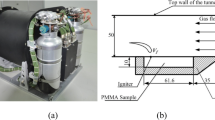Abstract
Most combustion experiments on microgravity conditions require extensive testing time, thus making necessary the use of sounding rockets, satellites and spatial laboratories. Sounding rockets and satellites offer some advantages over spatial laboratories, i.e. less strict safety requirements than those in manned flights, the cost of the experiment is also lower.
In combustion experiments, the gas velocities inside test modules must be smaller than the characteristic velocity of the process. The initial spin stabilization of sounding rockets has been identified as a possible origin of residual velocities inside the aforementioned modules.
The object of the present work is to study the gas residual velocity in the module designed by SENER for carrying out of combustion experiments in microgravity conditions in sounding rockets.
Particle image velocimetry was used to measure these velocities. The study shows that, after the spin stabilization, a rapid slowing down of such velocities is produced, decreasing by 5 mm/s after 10 s and down to 0.1 mm/s after 40 s.
Similar content being viewed by others
Author information
Authors and Affiliations
Additional information
Received: 25 July 1995 / Accepted: 26 April 1996
Rights and permissions
About this article
Cite this article
Juste, G. Residual velocities in combustion experiments on board of sounding rockets. Experiments in Fluids 22, 103–110 (1996). https://doi.org/10.1007/s003480050027
Issue Date:
DOI: https://doi.org/10.1007/s003480050027




